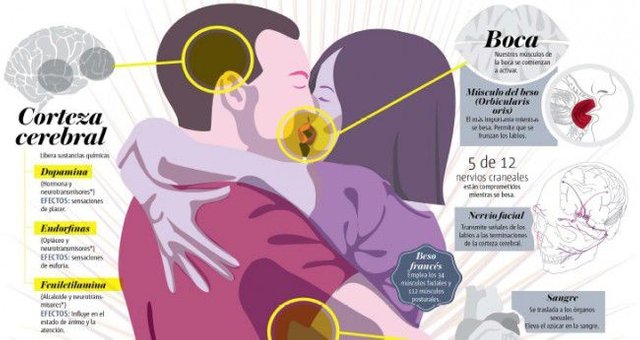THE SCIENCE OF KISS
Kissing has its own science: Filematology (not filetematology), which is dedicated to studying what are the reactions that occur in our body when we kiss or are kissed; Like, for example, that when we kiss we always turn our heads to the right because in our last weeks of gestation and lactation we turned it in that direction; Or that we always close our eyes because when the pupils dilate, the brain impels us to narrow them.
Kisses by themselves combine three senses: taste, touch and smell. Each separate sense is capable of producing a strong emotional and chemical reaction that causes astonishing changes in the organism.

CHOOSE COUPLE
Neuroscientist Wendy Hill states that the chemicals in saliva help us evaluate a potential partner to decide if they are the most suitable. Of the same opinion is Helen Fisher, professor of anthropology at Rutger University and world expert in the biology of love.
"Kissing is a powerful mechanism of adaptation" present in more than 90% of human societies. It involves numerous chemical substances that allow us to select the right pair. Male saliva has testosterone which, transmitted to a woman, increases her sexual desire.
The longer lasting and moist a kiss, the more testosterone the woman will receive and the more sexual desire she will experience.
Also, the man will detect through the kiss the levels of female estrogens that will indicate to his brain the degree of fertility of the latter.
Women can detect the immune system of the man through the kiss, a determinant to choose a partner, since it is usually chosen a man with a different immune system to ours to ensure that the offspring have one strengthened.

CHEMICAL REVOLUTION
One kiss involves five of the twelve cranial nerves. As it increases in intensity and duration, the nerve endings of the lips become more sensitive. These trigger signals to the cerebral cortex and release neurotransmitters, such as dopamine, endorphins and phenylethylamine.
A passionate kiss acts as a drug producing dopamine, responsible for the feelings of pleasure, motivation, euphoria and obsession. Endorphins, in addition to generating feelings of euphoria, relieve pain and fatigue, and phenylethylamine influences mood and attention.

REINFORCING THE AFFECTIVE LINK
Therefore, kissing strengthens the couple's affective bond by favoring long-term relationships because it involves the three different brain systems that allow pairing and reproduction: sexual attraction, governed by testosterone; Romantic love, governed by dopamine, and attachment, governed by oxytocin that fosters union, allowing a couple to stay together long enough to raise children.
Wow!
Thank You for Sharing. Very Informative. The Human Body is so Fascinating!